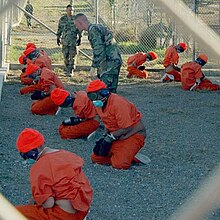U.S. government seeks to examine Guantanamo inmates' documents
Saturday, July 8, 2006

Lawyers asked a federal court Friday to allow the government to inspect written materials that it seized from inmates at Guantanamo Bay last month and requested approval to use "filter teams" to look at documents that may contain privileged lawyer-client communication.
In documents they filed with the U.S. District Court for the District of Columbia, government lawyers argued that three inmates who committed suicide last month by hanging themselves coordinated their actions by using attorney-client confidentiality to communicate with each other. Government officials said that among papers marked "Attorney Client Privilege" were instructions on how to tie knots and a classified memo on camp activities and inmate locations.
Military officials seized more than 1,100 pounds of documents from inmates after the suicides on June 10. They have since stopped defense lawyers from sending any documents to inmates.
In an affidavit that lawyers for the government filed with the court, Rear Admiral Harry B. Harris Jr., the naval commander of the camp, described evidence of a "larger plan or pact for more suicides" among detainees. His statement implied that the investigation might extend to defense attorneys as third parties who "encouraged, ordered or assisted" the detainees in killing themselves.
Harris earlier described the suicides as part of a pattern of hostile actions on the part of terror suspects. "They have no regard for life, either ours or their own," he said last month. "I believe this was not an act of desperation, but an act of asymmetrical warfare waged against us."
The Center for Constitutional Rights, which has provided legal assistance to about 200 Guantanamo detainees, has been critical of the conditions at Guantanamo Bay that they say finally led the detainees to kill themselves in desperation.
Barbara Olshansky, a deputy legal director at CCR, described the government's latest legal activity as a tactic to impede detainees' access to legal representation "and to make these lawyers fight for yet another thing."
Last month after the document seizures, defense attorney Richard Wilson, who represents a Canadian detainee, said in an affidavit that the military had told him that they were conducting no investigation into the role of attorneys in the prisoners' deaths.
He added, however, that at least one detainee claimed that camp officials had confiscated his written materials and told him that they were looking into "whether lawyers had actively encouraged detainees to commit suicide."
Related news
- "Three inmates commit suicide at Guantanamo detention facility" — Wikinews, June 11, 2006
Sources
- Josh White. "Signs of Detainees' Planning Alleged" — Washington Post, July 8, 2006
- "Center for Constitutional Rights Blasts Bush Administration for Suicides at Guantanamo" — Center for Constitutional Rights,
- "Guantanamo suicides 'acts of war'" — BBC News, June 11, 2006
- Ben Fox. "Guantanamo Lawyers Say Letters Seized" — Associated Press, Jun 30, 2006